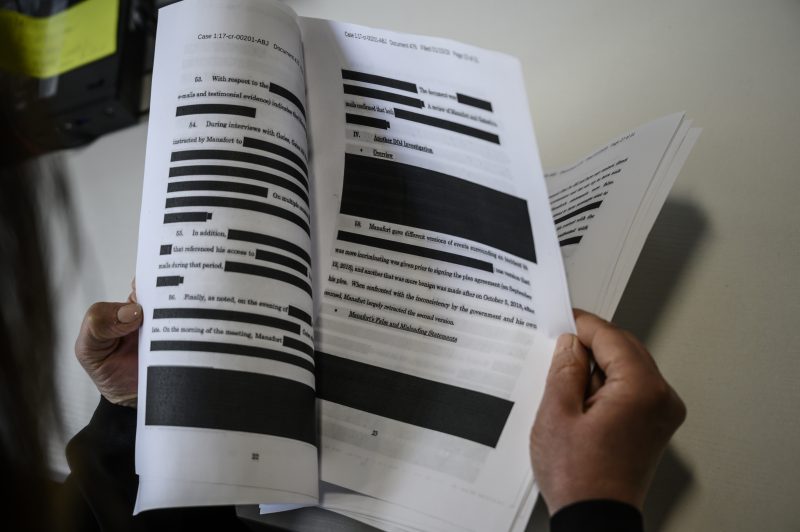Blackout: much of the Mueller report could be redacted
A journalist reads a redacted court filing from Special Council Robert Mueller; many worry that key parts of his final report will be similarly censored (Eric BARADAT)
Washington (AFP) – The final report from Special Counsel Robert Mueller’s Russia investigation on Thursday could leave much of the public unsatisfied because it could be heavily redacted, stripped of significant evidence and testimony that the investigators gathered.
Attorney General Bill Barr made clear he will edit out large parts of Mueller’s 400-page final report on his investigation of President Donald Trump and Russian election meddling.
Removed elements will include information from US intelligence used in the probe, information on ongoing investigations, and information on targets of Mueller’s team that never gelled and, if made public, could unfairly hurt them.
Crucially, Barr says the law prevents him from revealing materials from the two grand juries that the special counsel convened for his investigation.
Redaction — blacking out words and blocks of text with real or digital ink, or leaving pages completely blank — is the way bureaucrats and courts prevent the public from learning about classified information and secret testimony or evidence, or just embarrassing information.
Many court filings in the Mueller probe came with pages heavily blacked out, with prosecutors not wanting to tip their hands on ongoing parts of the sprawling Russia probe or expose sources.
But some worry Barr’s redactions could have political aims.
A Trump appointee who has already announced that the report exonerates the president from wrongdoing, he has much leeway on what he will withhold.
Barr said he wants as much of the report public as possible, but his editing could mask key elements of the 22-month investigation, which concluded with no charges against any Trump associates for colluding with Russia’s meddling in the 2016 election.
And it could mask evidence behind the allegations of criminal obstruction against Trump — on which Mueller refused to reach any conclusion.
– Grand jury secrets –
Most attention is focused on the testimony and evidence Mueller’s team presented to the grand juries.
Grand juries are special panels of citizens convened in secret by prosecutors investigating major federal crimes.
Part of a system designed to keep control of overzealous prosecutors, the panel reviews evidence and testimony and decides whether there is enough to indict the target of a probe.
By law, grand jury proceedings are kept secret. If an indictment is forthcoming, prosecutors will still have to make their evidence public, giving defense attorneys the chance to challenge it.
And if the panel does not approve charges, the information is kept secret to protect those accused without sufficient merit.
So Barr conceivably could black out information in the report that is potentially damning to Trump.
He said his redactions will be color-coded to explain why the material is omitted.
But Democrats in Congress say that won’t be enough.
They say that they have the right to see the entire report unredacted, in order to judge for themselves if Trump committed a crime.
“Congress requires the full and complete Mueller report, without redactions,” House Judiciary Committee Chairman Jerry Nadler said in a letter to Barr at the end of March.
“There is ample precedent for the Department of Justice sharing all of the information that the attorney general proposes to redact to the appropriate congressional committees.”
Nadler says he will subpoena the report if Barr doesn’t hand it over.
In addition, US media can be expected to file suits demanding more of the material be made public.
Buzzfeed journalist Jason Leopold has already filed a Freedom of Information Act request for the report, with plans to challenge the redactions.
On Tuesday, a Washington judge rejected the Justice Department’s effort to block Leopold’s request, noting the American public has reason to demand full transparency.
Disclaimer: Validity of the above story is for 7 Days from original date of publishing. Source: AFP.


